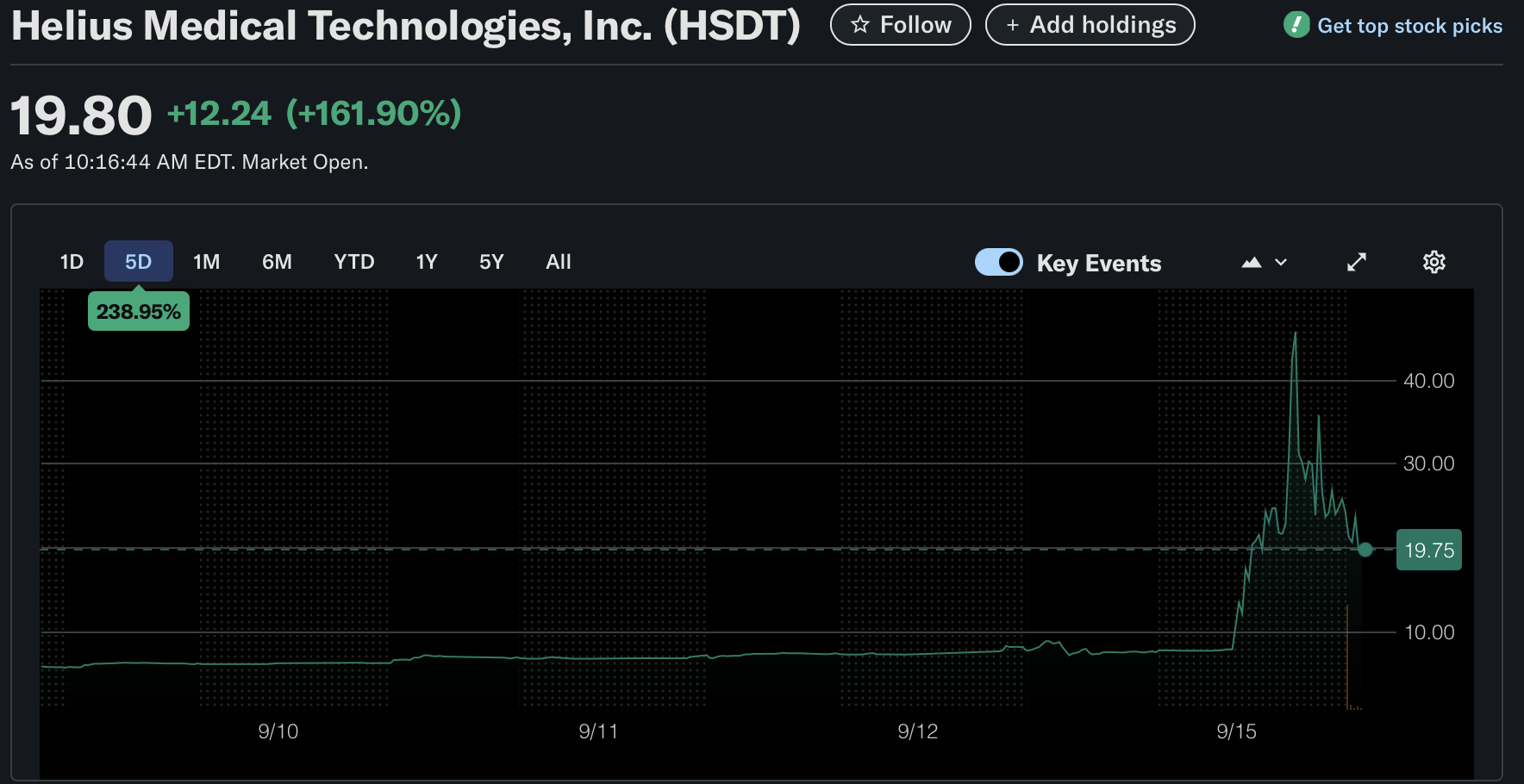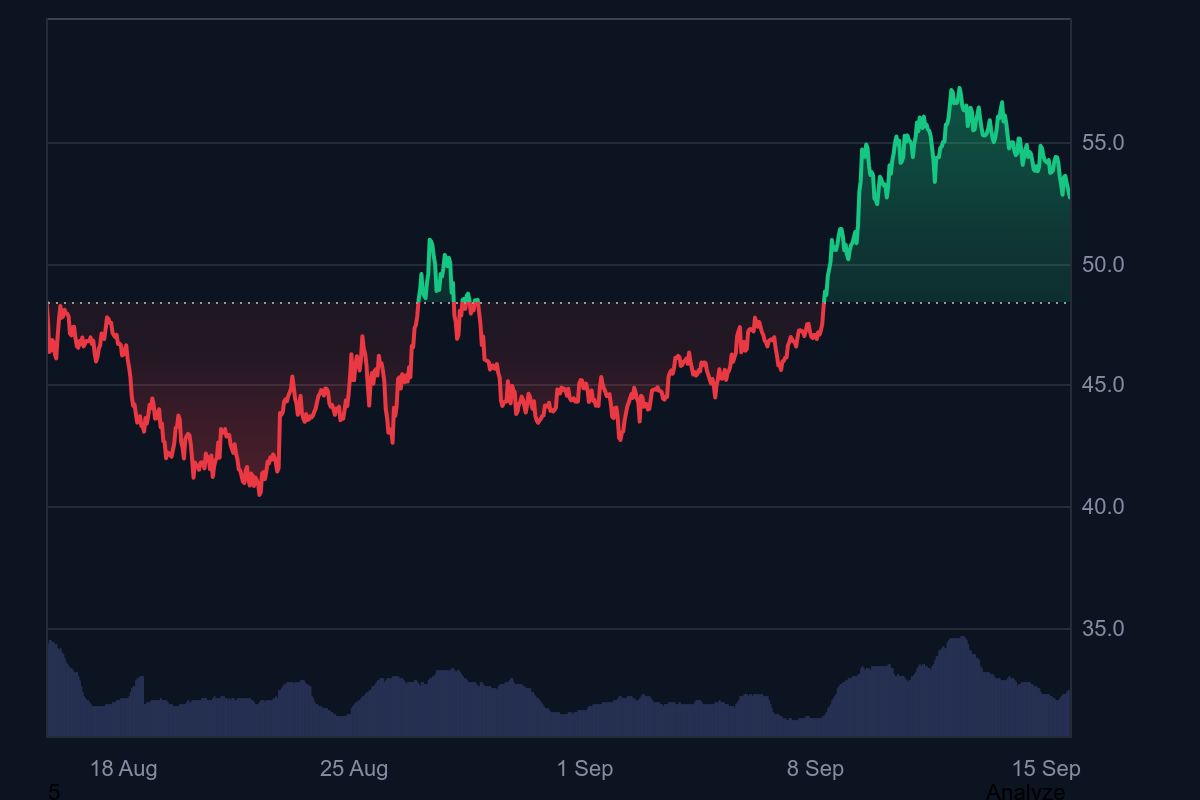Helius Medical’s $500M Solana Gamble Ignites 250% Stock Frenzy
Medical tech firm bets big on blockchain—and Wall Street loses its mind.
The Solana Surge
Helius Medical just dropped half a billion on Solana integration—and watched their stock explode 250% in days. Not bad for a company that used to just make medical devices.
Blockchain Bandwagon
Turns out slapping 'crypto' on your business model still works like magic. Investors piled in like it was 2021 all over again—because nothing says 'innovation' like chasing the latest shiny object in digital assets.
Finance's Favorite Fever
Traders bought the hype without asking questions—classic move. Who needs due diligence when you've got FOMO and a chart that only goes up? Meanwhile, the actual medical division probably wonders when they became a crypto hedge fund.
Speculation beats substance—every single time.
From Medical Devices to Digital Assets
Helius Medical is best known for its neurological treatment devices. But on September 15, the company revealed a new chapter: a $500 million private investment in public equity (PIPE) deal, backed by some of crypto’s most prominent names, including Pantera Capital, Summer Capital, and Animoca Brands. If stapled warrants attached to the deal are fully exercised, an additional $750 million could FLOW into the company.


Rather than plowing the proceeds into its existing business, Helius said it would direct the capital into a digital asset treasury strategy built around solana (SOL). In practice, that means Solana tokens will become the company’s core reserve asset, much as MicroStrategy adopted Bitcoin.
The company emphasized that the approach is designed not only to accumulate SOL but to put those holdings to work through staking and DeFi opportunities under what it calls a conservative risk framework.
Why Solana?
Choosing Solana was no accident. With millions of daily active users, billions of processed transactions, and a native staking yield of roughly 7%, the blockchain is often cited as one of the fastest and most affordable networks in the crypto space.
For backers like Pantera Capital founder Dan Morehead, this MOVE isn’t just financial engineering, it’s about aligning with what he sees as the backbone of future finance.
“Solana is a category-defining blockchain,” Morehead noted, arguing that anchoring reserves in its ecosystem could accelerate institutional and retail adoption worldwide.
The decision positions Helius as a kind of “productive treasury company” – one that can report transparently to shareholders while using Solana’s yield mechanics to create returns beyond price appreciation alone.
A Stock Caught Fire
News of the pivot triggered an extraordinary response. Before the opening bell on Monday, HSDT surged from single-digit levels into the mid-$20s, representing a 250% spike. The rally briefly gave the stock the look of a meme-like sensation, with traders piling in simply to capture the momentum.
By mid-morning, however, reality set in. Shares slipped back below $20, though the retracement still left them more than 160% higher on the day. According to five-day chart data, HSDT is now up nearly 239%, a staggering gain that reflects how quickly capital can flood into high-risk, high-reward equities once a bold narrative catches fire.
This broader shift isn’t confined to Solana or Bitcoin. Other companies are experimenting with similar models, turning equity listings into structured gateways for crypto exposure. A standout example is HYLQ Strategy Corp, which has rebranded itself as “The Public HYPE Treasury” after abandoning its earlier diversified portfolio across gaming, fintech, and blockchain.
HYLQ’s Distinctive Play on HyperLiquid
Under the leadership of Executive Chairman Antanas “Tony G” Guoga and CEO Matt Zahab, who previously helped generate more than CAD $200 million at SOL Strategies, HYLQ has built a straightforward strategy: accumulate HYPE tokens and let shareholders ride HyperLiquid’s expansion without needing direct DeFi exposure. The company now holds nearly 29,000 HYPE tokens, acquired between $37–$39 each, and with prices now around $52, those positions have nearly doubled in value.


What sets HYLQ apart is its listing on the Canadian Securities Exchange, which provides audited reporting and regulatory oversight absent in most crypto-related equities. That legitimacy allows investors to access a high-growth DeFi ecosystem through familiar brokerage accounts. Hyperliquid itself has already processed over $2 trillion in lifetime transaction volume, and its Layer-1 blockchain can handle 200,000 transactions per second with zero-gas fees and sub-second settlement times. Analysts increasingly view HYLQ as a serious, regulated candidate in decentralized trading, the equity-market equivalent of a direct bet on HyperLiquid’s dominance.
Outlook
Helius Medical’s dramatic pivot has already achieved its first goal: putting the company firmly on the map. By anchoring its balance sheet to Solana through a $500 million-plus treasury plan, HSDT has gone from obscurity to one of the most closely watched small-cap stories of 2025.
Equity traders now see the stock as a rare crossover play, volatile, speculative, and unlike anything else in its peer group. To Solana supporters, the move serves as further validation of the network’s resilience and growing institutional recognition. Skeptics, however, continue to view the pivot as a high-stakes gamble that may be more about narrative than sustainable fundamentals.
What’s clear is that the marriage of a Nasdaq ticker and Solana exposure ensures Helius Medical will remain a headline name well beyond this week’s 250% surge. And it is not alone. Other firms, like HYLQ Strategy Corp with its HyperLiquid-focused reserves, are exploring similar equity-based models to bridge traditional markets and DeFi, hinting that Helius may be part of a much broader trend.
Buy HYLQ![]()



